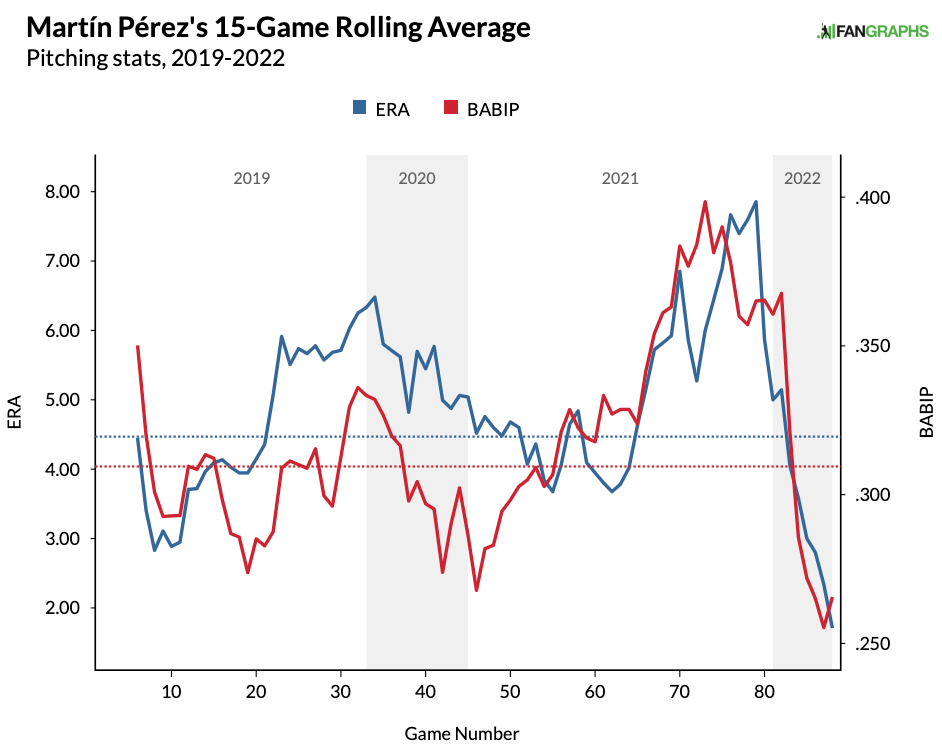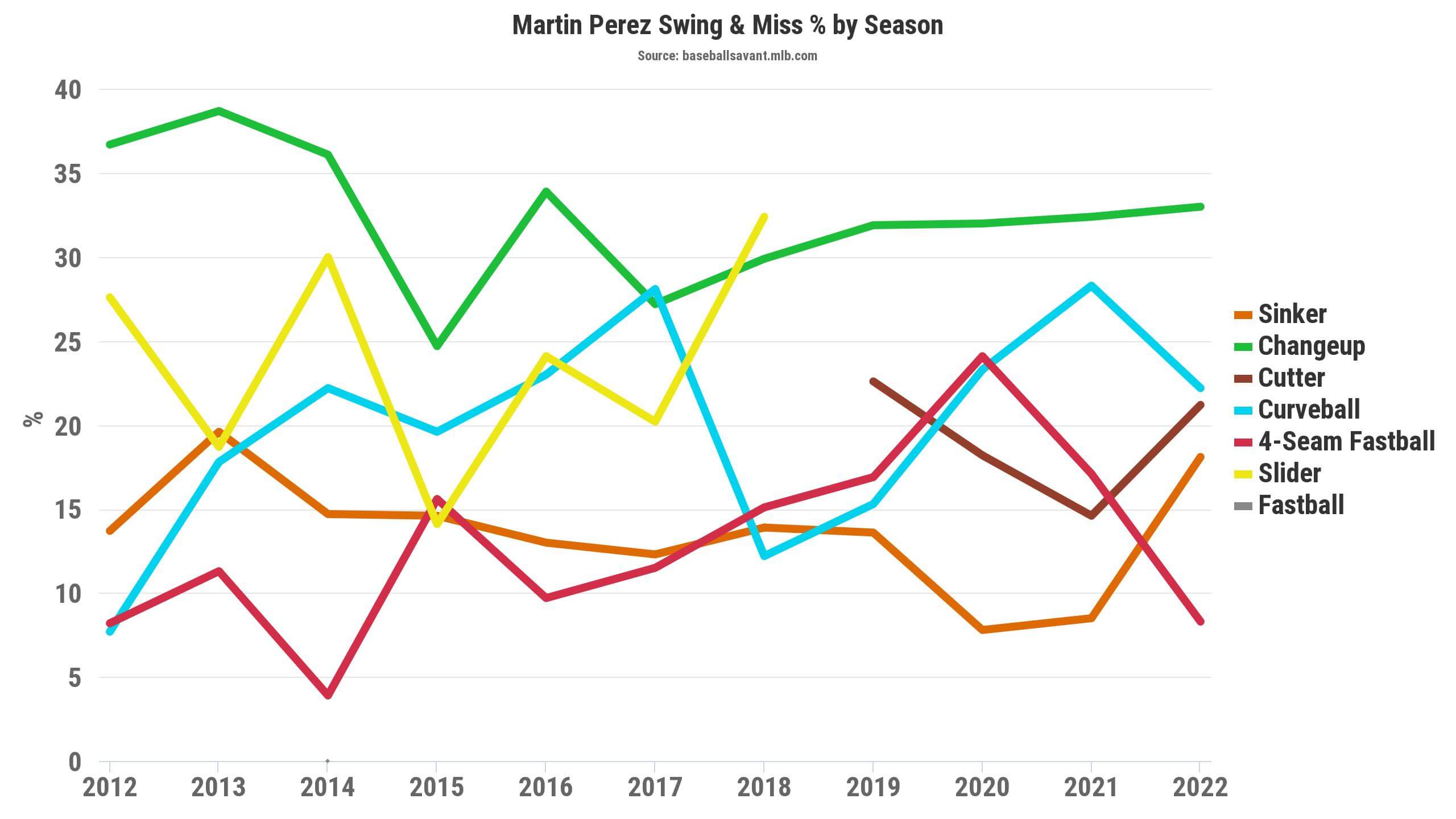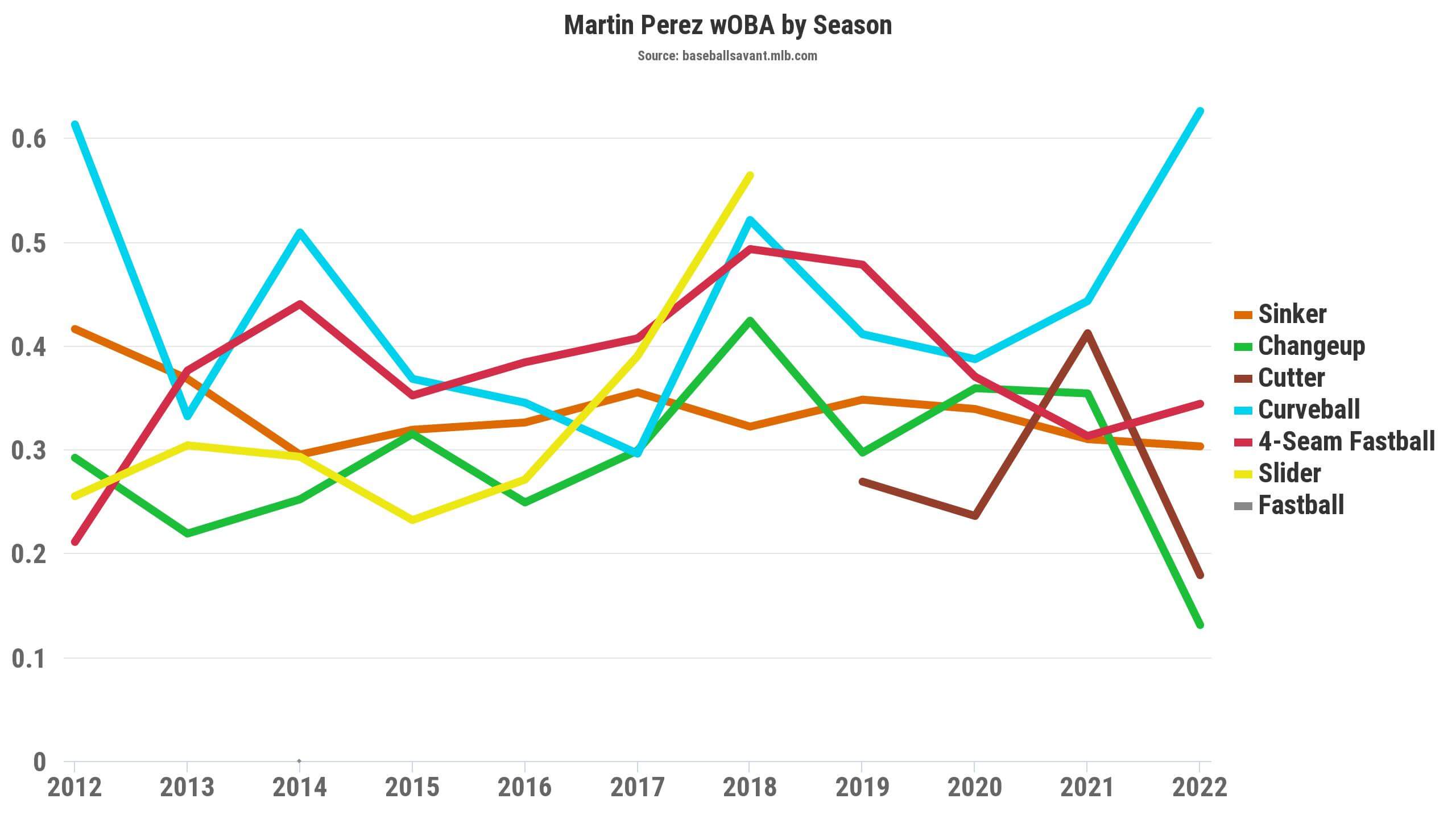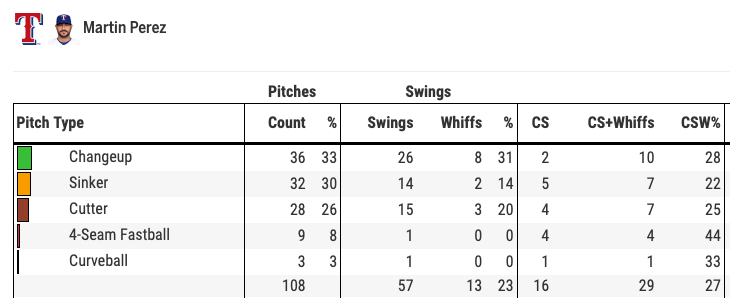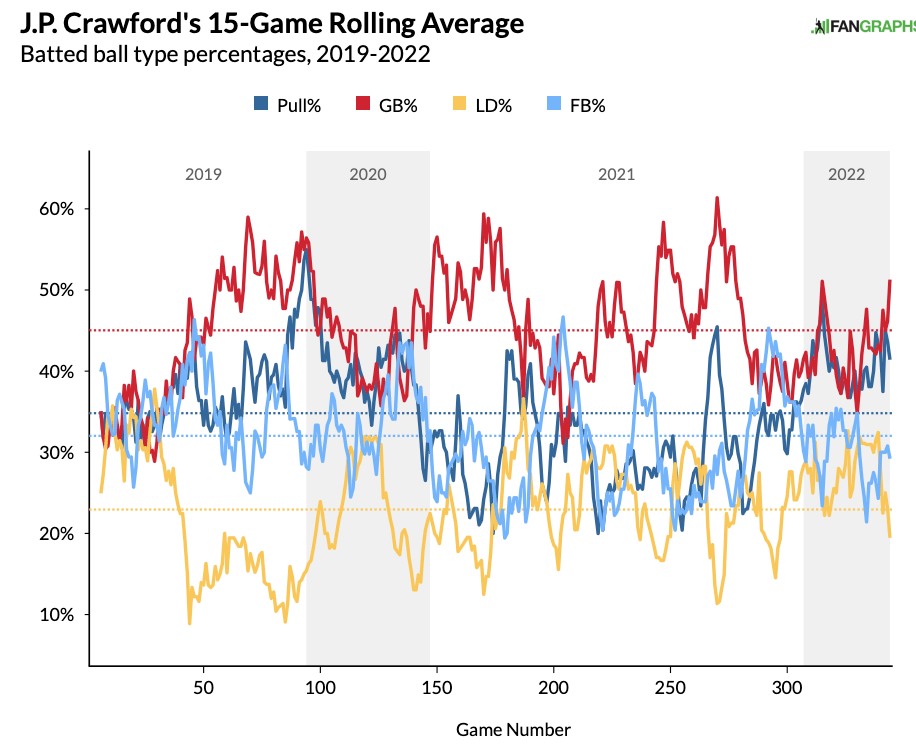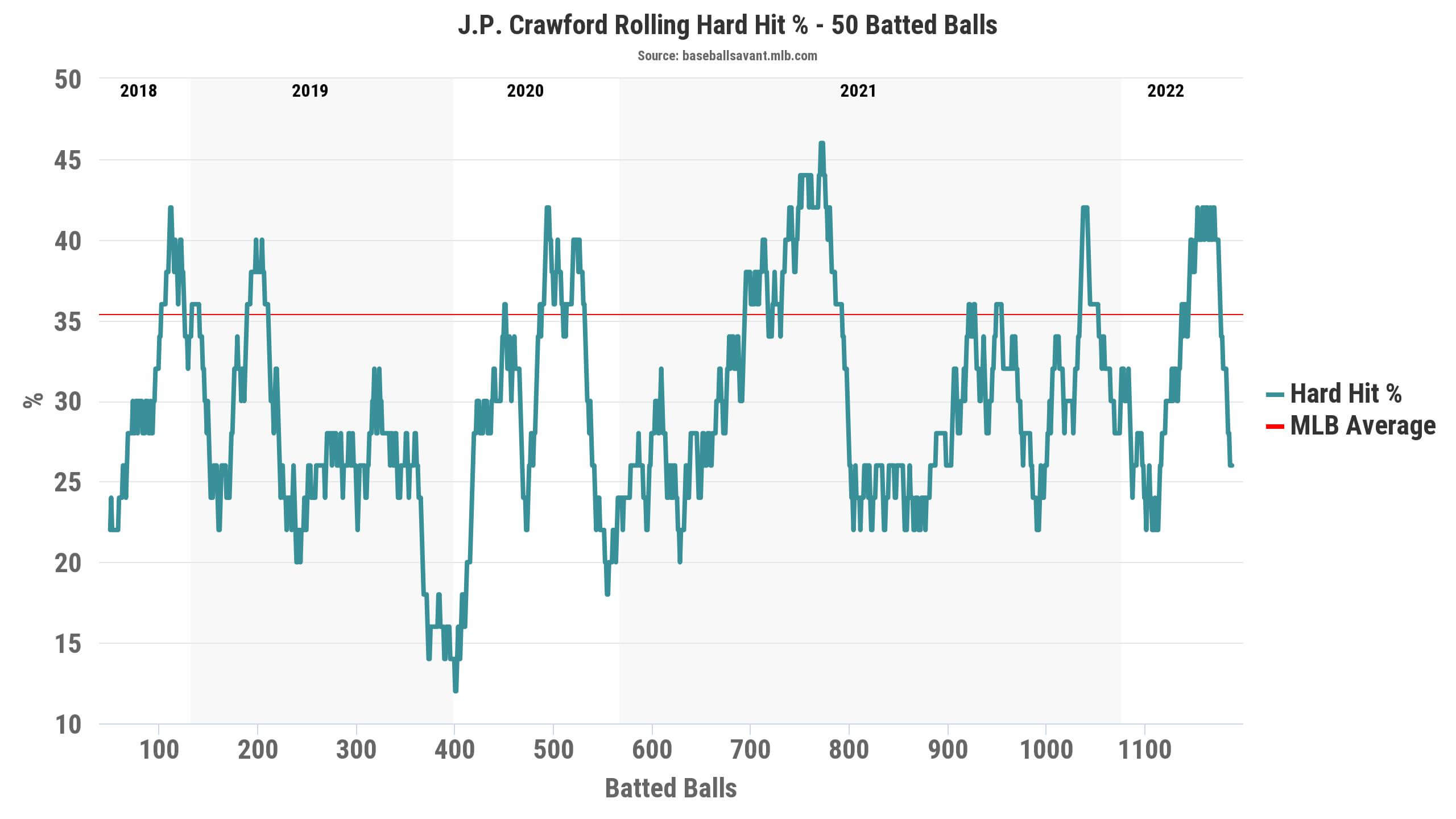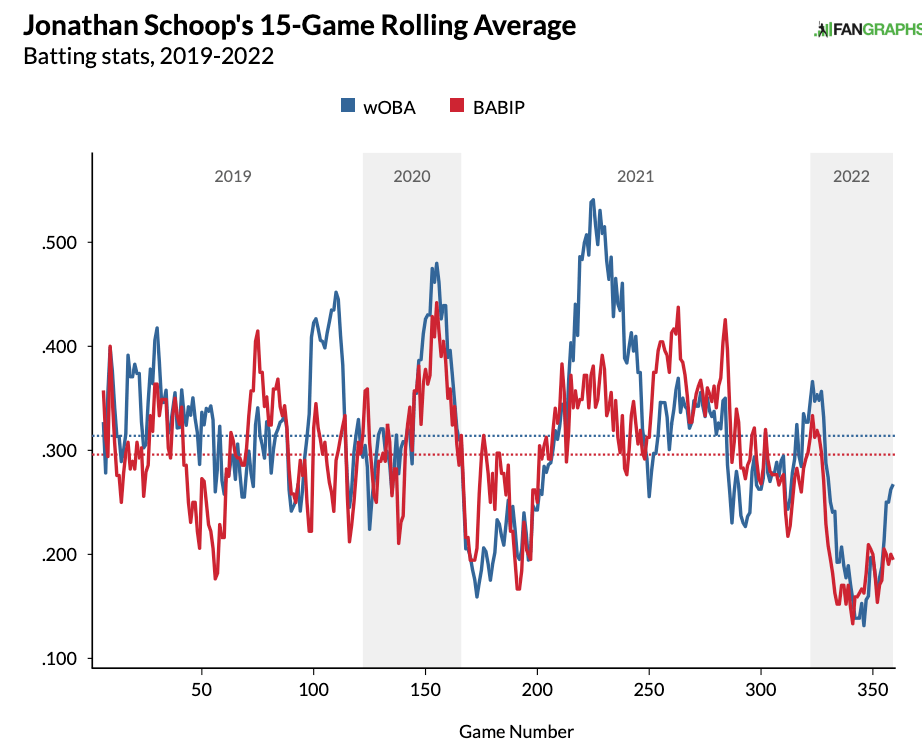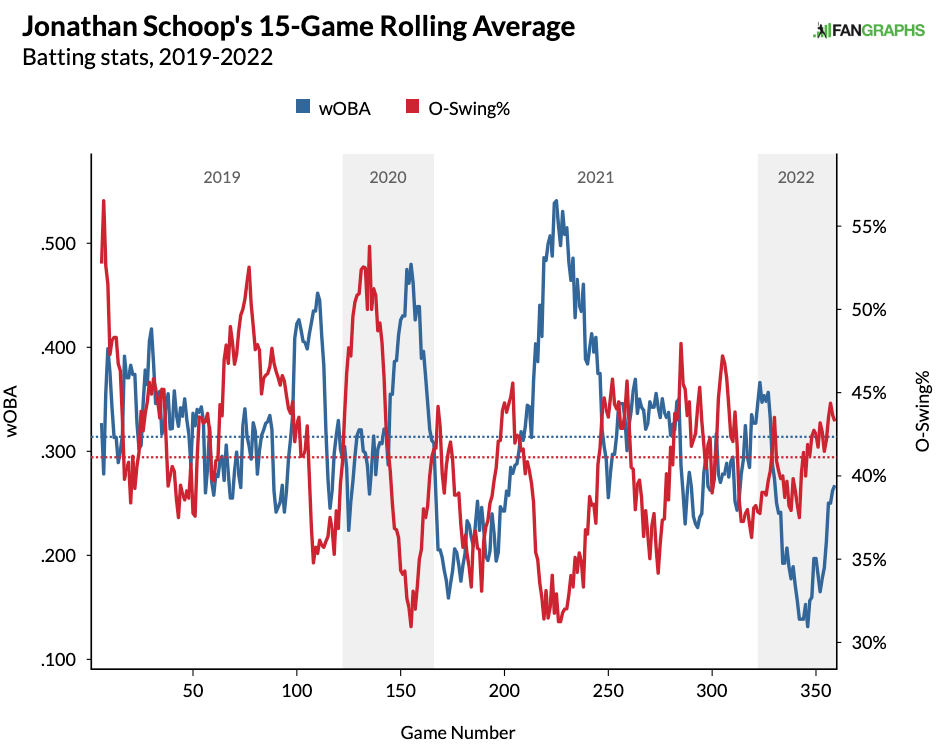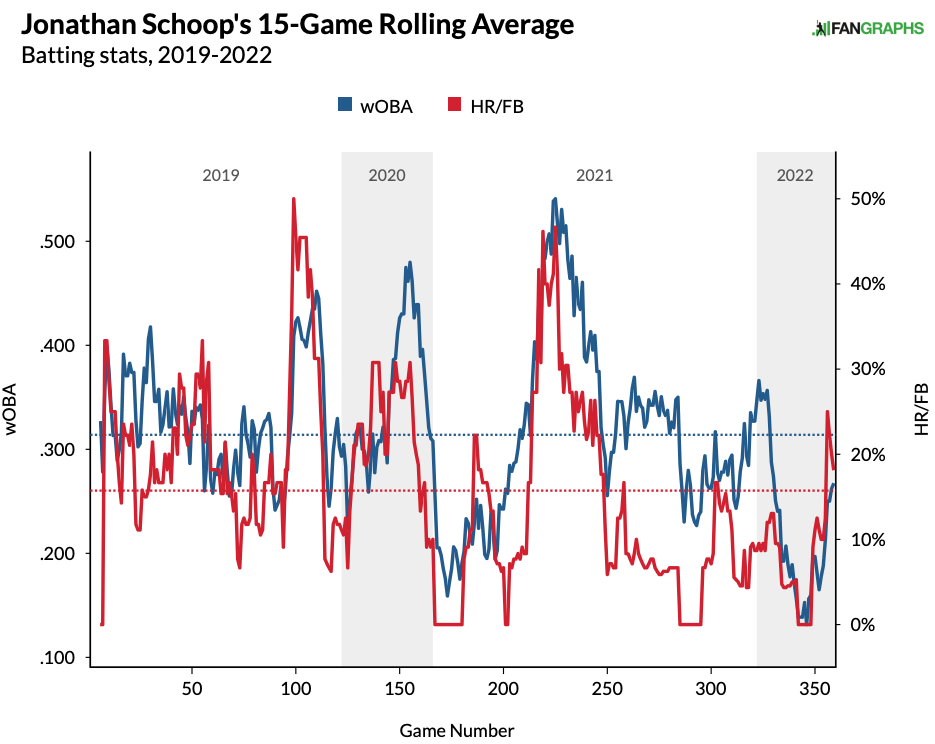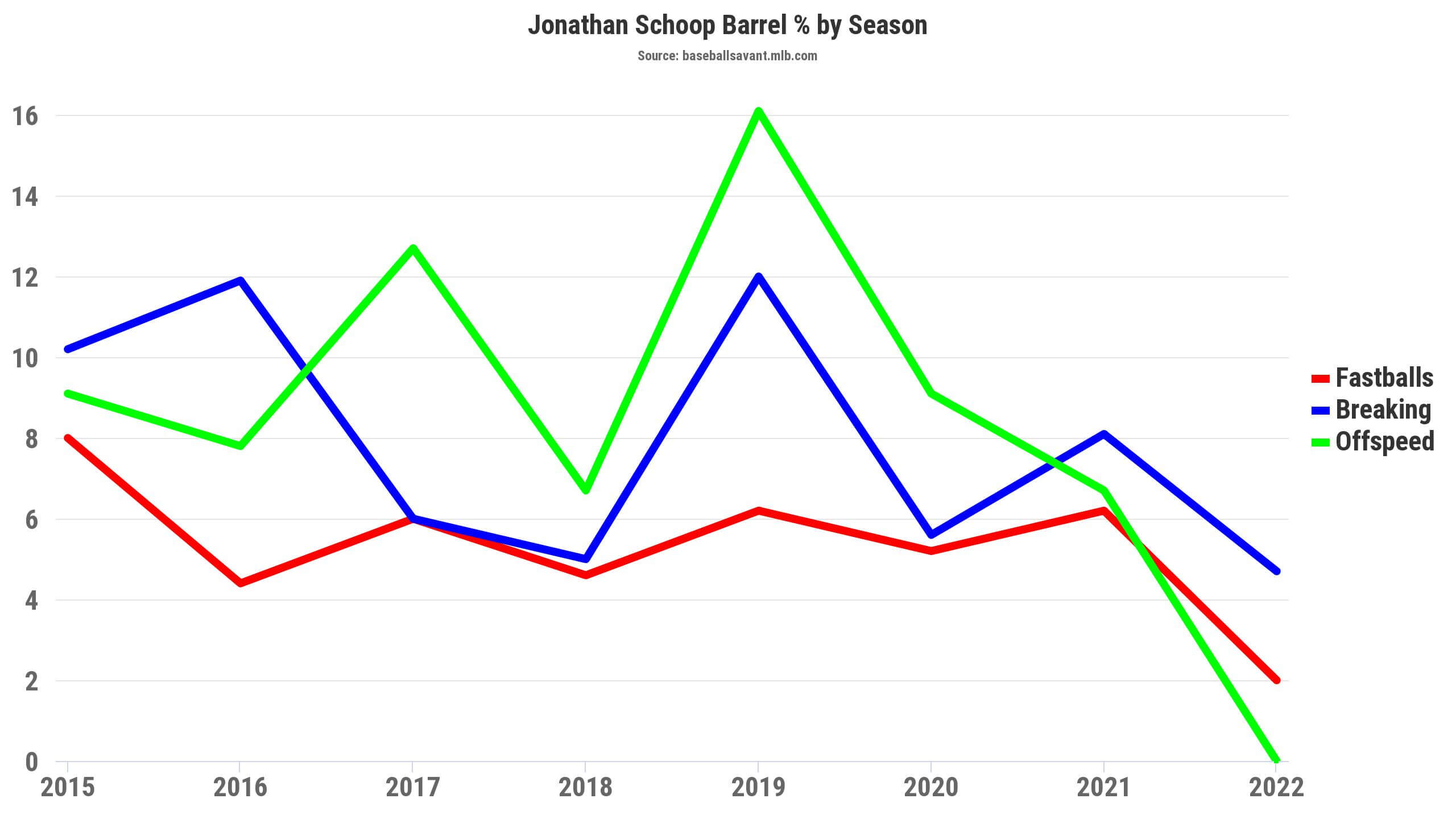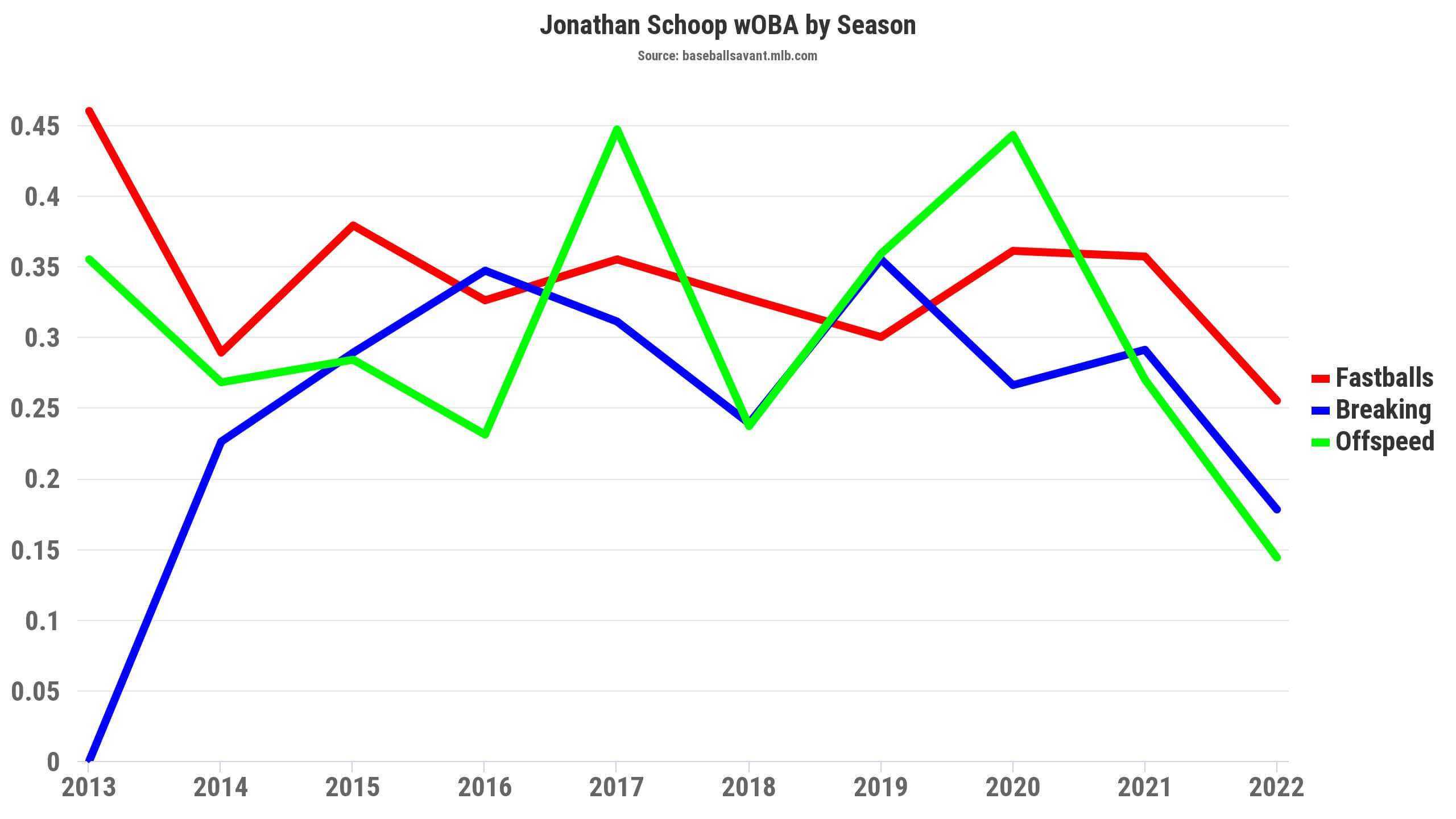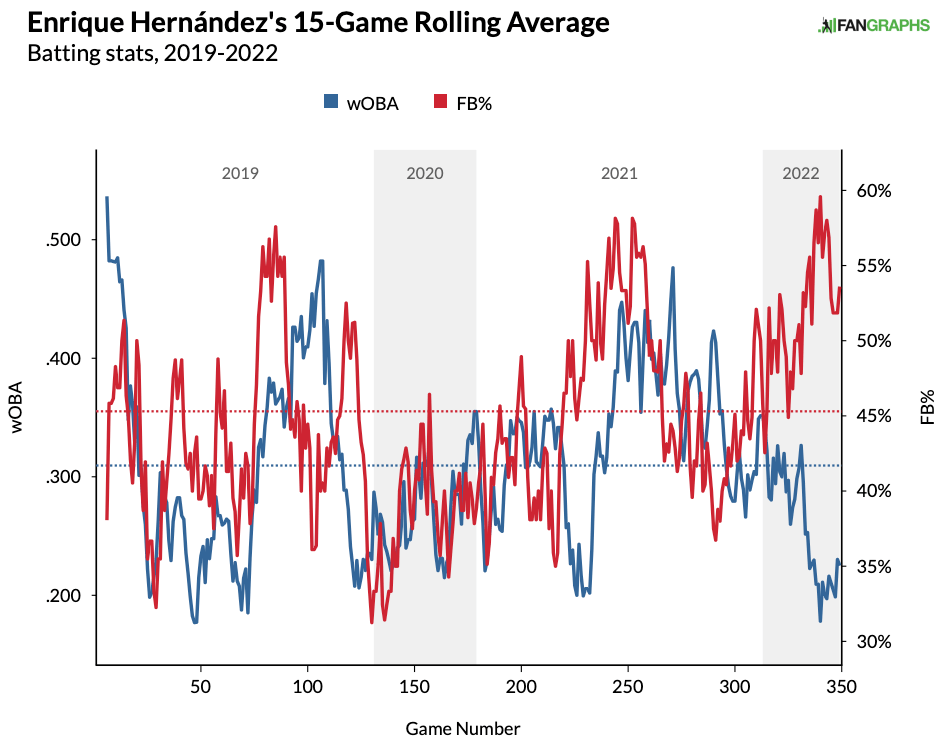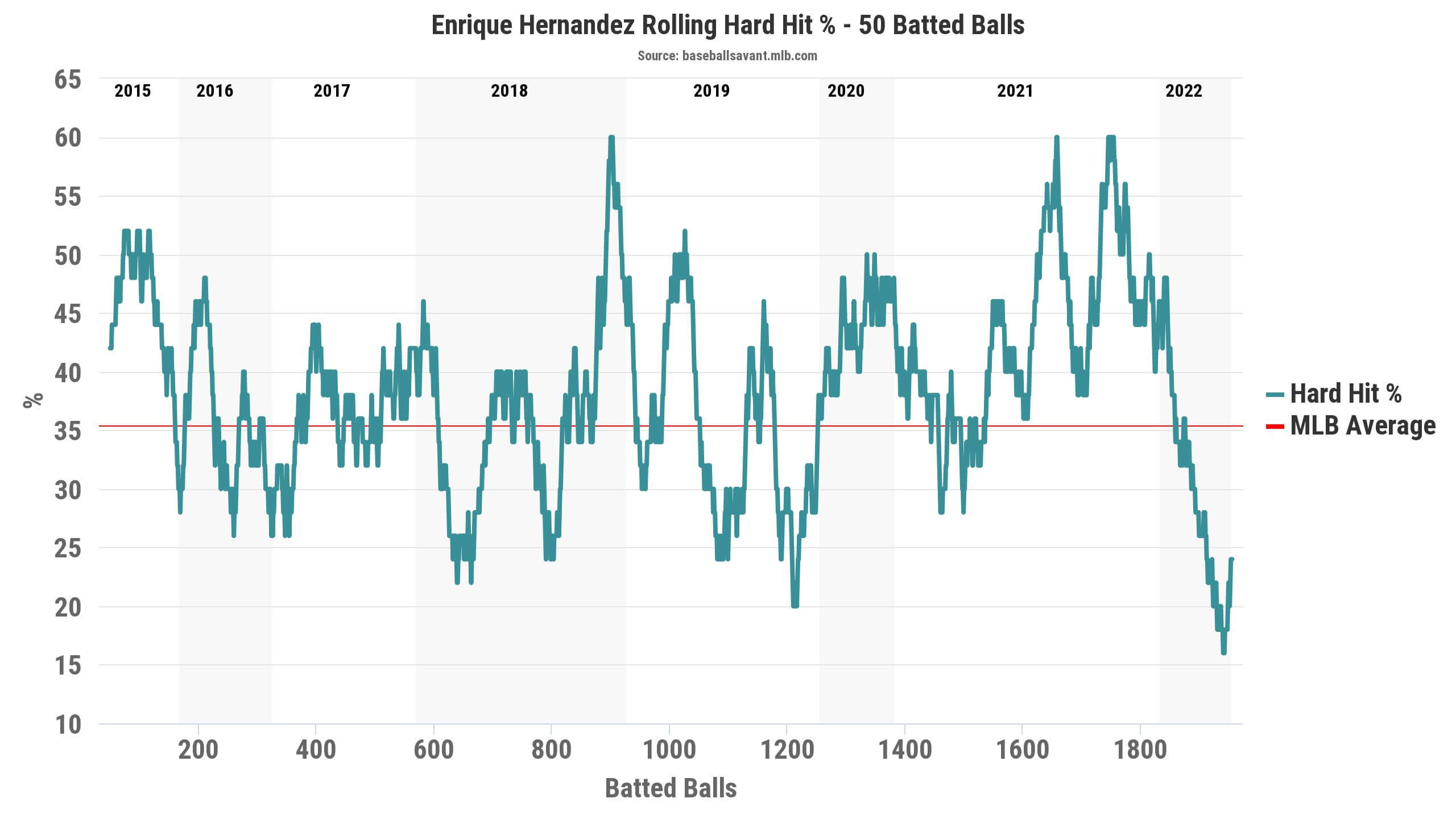Fantasy Baseball Hot & Cold Players
It helps us validate or question the players on our rosters with nearly two months of baseball data. In this week’s installment of hot or cold players, we uncover the underlying metrics of four players. Two of the hot players garnered less attention from a roster rate standpoint. However, we’re deciding whether to cut or hold these cold players, particularly in deeper league formats. Throughout this process, we’re asking ourselves – do the metrics support the results and whether it’s sustainable for the rest of the season.
Hot Players
Martin Pérez (SP, TEX)
Could you guess the age of Martin Pérez? If not, it’s wild to think Pérez recently turned 31 years old in 11 MLB seasons. With a career ERA of 4.58 and WHIP of 1.46, Pérez rocks a 1.64 ERA and 1.01 WHIP. Throughout Pérez’s career, he has a .311 BABIP and 69.1% LOB%. In 2022, Pérez’s BABIP remains lower at .273, but an improved LOB% at 75% after the complete-game shutout against the Astros.
Although it’s a small sample of 49.1 innings, Pérez boasts a career-best 19.9% strikeout rate and 6.3% walk rate. Pérez hardly stood out with a 15.5% strikeout rate and 8.2% walk rate throughout his career. Thankfully, home runs haven’t been an issue, with a career 1.02 HR/9 with zero home runs in 2022. Pérez generates a 49.5% GB% in his career versus 55.8% in 2022.
Pérez’s Arsenal & Results
Interestingly, Pérez adjusted the pitch mix in 2022 with a sinker (39.5%), changeup (23.9%), and cutter (20.8%) thrown at a double-digit rate. In 2021 with Boston, Pérez shook up the pitch mix with the cut fastball (28.9%), sinker (25.3%), changeup (24.3%), and four-seamer (13.1%).
Against right-handed hitters in 2022, Pérez shifted the pitch mix with the sinker, changeup, and cutter as the primary trio. However, Pérez swapped the cutter and sinker usage in 2022 versus 2021. Meanwhile, against lefties, Pérez nearly matched the pitch usage from 2021 to 2022.
The calling card for Pérez involves the changeup, evidenced by the 20.5% SwStr% in 2022 versus a career rate of 16.4%. Interestingly, the chase rate on the changeup at 54.5% seems outrageous compared to the career O-Swing% of 37%.
The results on the changeup look silly in 2022 with a .118 BA, .157 SLG, and .131 wOBA. It’s not terrible, but Perez allowed a .253 BA, .399 SLG, and .300 wOBA throughout his career, not including 2022. However, Pérez’s changeup doesn’t pop from a movement perspective.
Pérez’s cutter and four-seamer remain two of his best pitches in movement, with more than two inches versus the average in either drop or break. Amongst Perez’s three primary pitches in the sinker, changeup, and cutter, all have allowed a slugging percentage and wOBA south of .300 outside of the sinker.
Takeaways
In NFBC leagues, Pérez has a roster rate just under 50%, meaning he might be available in 15-teamers. That indicates Pérez serves as a deep-league streamer, though fantasy managers might hesitate in plugging him into their starting lineups.
Pérez casually threw a complete-game shutout against the Astros on Friday with eight hits and one walk with five strikeouts. He pitched efficiently with 108 pitches and nine hard-hit batted balls. Although none of the pitch results looked eye-popping, the 31% Whiff% on the changeup isn’t too shabby. Overall, it’s hard to argue with the continued results as a streaming pitcher in most formats.
J.P. Crawford (SS, SEA)
The once top prospect in J.P. Crawford is building upon his 2021 season with a career-high of 687 plate appearances. Crawford remains one of the hottest hitters to begin the 2022 season with four home runs, 18 runs, 11 RBI, and one stolen base with a .289 batting average. He also serves as an OBP asset with .368 OBP in 2022 versus a .338 in 2021.
Crawford’s Batted Ball Profile
The batted ball profile looks positive with a 25% LD% with the GB% and FB% remaining similar to the career rates. However, Crawford increased the Pull% to 42%, up from 30.4% in 2021. Typically when we see a higher pull rate, we assume an attempt to tap into the pull-side power.
Crawford’s 11.8% HR/FB% in 2022 versus a career rate of 6.5% indicates the power rate increased. He typically shows patience with an O-Swing% lower than the league average. However, the 27.1% O-Swing% rose from 25.5% in 2021. Thankfully, the Z-Contact% (91.2%) and Contact% (80.6%) look similar and above average.
Unfortunately, Crawford doesn’t pop in the contact quality metrics with a 3.6% Barrel% and 2.5% Barrel/PA. Even Crawford’s 30.4% hard-hit remains similar to the career norms of 29.3%. The rolling hard-hit rates show Crawford falling off, but it showed peaks like in the middle of the season in 2021.
Takeaways
One underrated note on Crawford involves the lineup spot. Crawford started in the bottom third of the Mariners lineup, then from April 14 and beyond, he batted third through fifth, meaning more counting stats. In 2021, Crawford boasted a quality .273 batting average with a .320 BABIP, plus a 23.6% LD%. Crawford should accumulate runs and RBI with an above-average BA, yet don’t expect more than 12-15 home runs.
Cold Players
Jonathan Schoop (1B/2B, DET)
Another “boring” accumulator, Jonathan Schoop, started the 2022 season slow with three home runs and a .161 batting average. In 2021, Schoop racked up 22 home runs, 85 runs, 84 RBI, and a .278 batting average in 674 plate appearances. When looking at past seasons, Schoop provides similar fantasy value and production.
The .174 BABIP and low batting average should regress closer to the career BABIP of .296 and BA of .258. However, Schoop struggles from a plate discipline standpoint with a low 4.1% walk rate in 2022.
Schoop typically showed an aggressive approach with 41.3% O-Swing% in 2022, nearly identical to his career rates. Meanwhile, Schoop also boasts a Z-Contact% (89%) higher than the league average but an overall Contact% (77%) close to the league norms. Schoop usually hurts in OBP formats, but let’s look at his batted ball profile.
Schoop’s Batted Ball Profile
None of Schoop’s batted ball profile looks dissimilar from the career norms, with a 19.6% LD%, 46.4% GB%, and 33.9% FB% in 2022. In 2021, Schoop lowered the Pull% to 38.6%, but he has a career Pull% of 44.4% near the 2022 numbers (44.6%).
Schoop’s 7.9% HR/FB% in 2022 dropped compared to 13.5% in 2021 and a career rate of 15.9%. Like the BABIP, the HR/FB% regresses closer to the career norms, though the early struggles make it difficult to hold in leagues with 12 or fewer teams.
Unfortunately, the contact quality metrics dipped with a 2.7% Barrel% and 2% Barrel/PA for Schoop. The 40.2% hard-hit rate matches the 2021 numbers of a 40.2% hard-hit rate, but the maximum exit velocity of 110.9 mph is the lowest of his career. However, maximum exit velocity changes with a single batted ball event.
Unsurprisingly, Schoop has struggled against fastballs with a .193 BA, .263 SLG, and .255 wOBA. In 2021, Schoop finished with a .324 BA, .468 SLG, and .357 wOBA against fastballs. He has a .285 BA, .440 SLG, and .333 wOBA against heaters throughout his career.
Takeaways
It’s hard to latch onto any skill for Schoop in 2022, but we expect positive regression. The BAT X projects Schoop for 13 home runs, 47 runs, 51 RBI, and one stolen base with a .250 batting average. They project the BABIP to regress, meaning the batting average should improve. In 15-team leagues, hold onto Schoop. However, in 10 or 12-teamers, fantasy managers could consider cutting for a hot hitter or pitcher, especially in formats without a corner or middle infield spot.
Enrique Hernández (2B/OF, BOS)
After a career-high in plate appearances of 585, Enrique Hernández had an NFBC Main Event ADP of 220 near hitters like Ian Happ, Eduardo Escobar, Bobby Dalbec, A.J. Pollock, and Oneil Cruz. Like Schoop, Hernández has struggled with one home run and a .177 batting average. However, the 21 runs and 17 RBI help the positive rotisserie value of $1.
Hernández’s walk rate dipped to 8.3% compared to 10.4% in 2021, and the OBP dropped to .262 versus .337 in 2021. Although the 86.9% Z-Contact% and 76.3% Contact% in 2022 look similar to the career norms, Hernández’s 30.4% O-Swing% and 11.8% SwStr% indicate a slightly aggressive approach. For context, Hernández has a career O-Swing% of 28.8% and Swing% of 45.7%. Since these aren’t drastic changes, it begs the question of some misfortune for Hernández in 2022.
Hernández’s Batted Ball Profile
Throughout Hernández’s career, he rocked a 42.7% FB%, but that jumped to 52.8% in 2022 versus 46.2% in 2021. With a flyball-heavy profile, Hernández’s career BABIP of .270 makes sense.
The dip in batting average and BABIP aligns with the lowered line drive rate in 2022 with a 0.58 GB/FB versus a career rate of 0.88. Hernández’s Pull% of 43.9% aligns with the career rates, but the 1.5% HR/FB% should regress closer to his career rate of 11.2%.
After a career-best of 8.4% Barrel% and 5.8% Barrel/PA in 2021, Hernández’s contact quality dipped closer to the career norms. In 2022, Hernández boasts a 7.3% Barrel% and 5.4% Barrel/PA. The increase in flyballs translated into Hernández’s launch angle bumping to a career-high at 23.8 degrees. However, Hernández’s 26.8% hard-hit looks worrisome given the 43.2% in 2021 and career rate of 37.9%.
Unsurprisingly, Hernández struggles against fastballs but performs decently against offspeed pitches. A reminder – opposing pitchers throw offspeed pitches under a double-digit rate in 2022, meaning it’s a smaller sample.
Takeaways
Like Jonathan Schoop, Hernández relies on accumulating results with less counting category juice. Home runs and stolen bases aside, Hernández reached career highs in 2021 in runs plus RBI. Hernández tied a career-best $10 of rotisserie value, meaning it’s a low floor and ceiling fantasy hitter. Thankfully, Hernández’s lineup spot hints at the Red Sox having confidence in him with 70.2% of his plate appearances at leadoff. The recommendation involves a lukewarm hold of Hernández in 12-15 team leagues, but his profile isn’t jaw-dropping.

